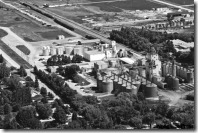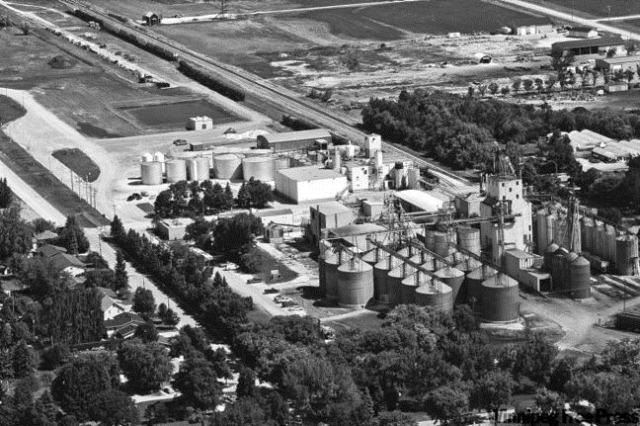 Bunge Ltd. is spending more than $100 million on a new canola-seed-crushing plant in Altona and may spend countless millions more on other facilities as it carves a place for itself in a post-Canadian Wheat Board world.
Bunge Ltd. is spending more than $100 million on a new canola-seed-crushing plant in Altona and may spend countless millions more on other facilities as it carves a place for itself in a post-Canadian Wheat Board world.
Soren Schroeder, the head of the global grain giant’s North American operations, said in an interview Thursday Bunge wants to start buying wheat and barley from western Canadian grain farmers if the federal government follows through with its plans to remove the board’s marketing monopoly next year.
Soren Schroeder of Bunge Ltd.
To do that, it would need to build or buy grain elevators on the Prairies, Schroeder said.
The suggestion that a global company like Bunge wants to enter the Prairie grain business is not a shock to industry players, but it would add a significant wrinkle to the changing dynamics of the industry.
"It would be surprising if they (Bunge) were not looking at this as an opportunity," said Kevin Hursh, executive director of the Inland Terminal Association of Canada, representing farmer-owned elevators.
Hursh estimated the 10 members of his association handle about 10 per cent of CWB grain. The Big Three Canadian grain companies — Viterra Inc., Richardson International Ltd. and Cargill Canada — handle the lion’s share of the rest. Paterson Grain, Parrish & Heimbecker Ltd. and Louis Dreyfus Canada also have inland terminals. They are represented by the Western Grain Elevators Association (WGEA).
Brenda Tjaden Lepp of FarmLink Marketing Solutions said Bunge entering the market would be good news for Prairie farmers.
"Forget about the risk of farmers getting taken advantage of by the Big Three," she said. "They (the Big Three) should be scared because it won’t be so easy for them anymore to buy grain."
A substantial restructuring of the inland terminal network took place about a decade ago, with scores of smaller, older terminals being closed, replaced by fewer, much larger and newer terminals. Few, if any, have been built in the last five years.
Some industry sources say there might soon be an active market for buying and selling terminals if Bunge is looking to get into the market. Some say they believe that Toepfer International, another international grain company, is also looking to become involved in handling Prairie agriculture production.
Toepfer has an office in Winnipeg, but an official was unavailable.
Wade Sobkowich, executive director of the WGEA, said as long as there is a level playing field, his members welcome new competition.
"It’s good for farmers, good for customers, and it brings efficiencies," he said. "Additional handling companies means there are more outfits competing for farmers’ grain. They may have competing streams of business with potentially different customer sets."
Bunge may also need to open a modestly sized Prairie regional office. Schroeder said Winnipeg would be the most likely location for such an office because it’s a grain industry hub and the company already has a small office here.
Altona, Dixon, Sask., and Fort Saskatchewan, Alta., would be logical locations for Bunge grain elevators because the company also owns properties in those communities.
Schroeder said an Altona elevator could be built on the site of Bunge’s existing canola-seed-crushing plant, which will be demolished when a new plant opens in early 2013. It would be equipped to handle other kinds of crops, as well, including soybeans and canola seed destined for the U.S. and other export markets.
The company has a seed storage facility in Dixon that could be redeveloped, he added.
The company has three or four locations that could be turned into grain-handling facilities, "and there could be others we could partner with or build or buy," Schroeder said.
No decisions are likely to be made until next year, he said, when it becomes clear how the CWB situation will unfold. He wouldn’t speculate on how big the grain elevators might be, or how much they might cost.
While the future of wheat and barley marketing in Western Canada is a hot topic in agricultural circles, Schroeder was more interested in talking about canola and Bunge’s growing presence in that segment of the industry.
The expansion of its seed-crushing capacity in Altona — from 1,100 to 2,500 tonnes a day — is the first phase of a multi-phase expansion and upgrading of Bunge’s four canola-seed-crushing facilities on the Prairies.
The company will replace its two older plants in Altona and Fort Saskatchewan and upgrade and expand its two newer ones in Harrowby and Nipawin, Sask., Schroeder said.
The company broke ground on the Altona project earlier this week. It will likely add five to 10 employees to the plant’s 80-member workforce to handle increased production, he said.
The Harrowby work will be done within the next year, and will involve upgrades to rail-car-handling and grain-storage facilities, as well as a modest expansion of seed-crushing capacity. Workers likely won’t be added at Harrowby.
The company’s seed-crushing expansion is demand-driven, Schroeder said.
Canadian farmers could harvest a record 14 million tonnes of canola this year. Bunge officials expect annual production to grow to 20 million tonnes by the end of the decade.
murray.mcneill@freepress.mb.ca martin.cash@freepress.mb.ca
Bunge Ltd. leads global agribusiness
Based in White Plains, N.Y.
Leading global agribusiness and food company founded in 1818
Approximately 32,000 employees
Operates in more than 30 countries
$42 billion in total sales in 2009
Extensive operations in Canada including port terminal facilities in Quebec; oilseed processing in Altona and Harrowby in Manitoba, Dixon and Nipawin, Sask., Fort Saskatchewan, Alta., and Hamilton, Ont.
Additional operations across the country
High-throughput Prairie grain elevators
The last one was built by Lethbridge Inland Terminal Ltd. at a cost of more than $20 million
The most recent sale of a terminal was in April 2011 when Richardson International acquired North East Terminal in Wadena, Sask., 200 kilometres east of Saskatoon; unconfirmed reports said the price tag was $25 million
In 2005, Richardson acquired four high-throughput grain-handling terminals from ConAgra
http://www.winnipegfreepress.com/business/grain-giant-steps-up-126001773.html

Deprecated: strpos(): Passing null to parameter #1 ($haystack) of type string is deprecated in /home/agriviek8Qv/agriviet.net/public_html/wp-includes/comment-template.php on line 2522